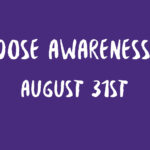
September is Recovery Month. At Merchants Quay, the recovery journey can begin with harm reduction. Harm reduction works towards keeping people who use drugs as safe as possible while supporting them to access treatment options.
At Merchants Quay Ireland, we support people who are homeless, sleeping rough, and/or dealing with drug and alcohol dependency.
Jenny O’Rourke is the Harm Reduction Lead at our Riverbank centre, engaging with clients who are in active drug use, and supporting them towards recovery options when they are ready.
Hi Jenny! Can you explain what harm reduction is?
Harm reduction is defined as a set of practical strategies and ideas aimed at reducing negative consequences associated with drug use. So basically, it involves making sure that people have access to clean equipment, information, support and pathways to recovery.
Why is harm reduction so important?
Harm reduction is critical in keeping people who use drugs alive and as healthy as possible. We educate clients on how they can use drugs safely, provide clean equipment and chat with them about how they are. Not only does harm reduction go a long way towards helping people in addiction stay as healthy as possible, it also keeps them linking in with our service, and growing and maintaining trusting relationships with staff. When a client is coming to our needle exchange regularly, we can keep track of their drug use, if it’s improving or if it’s worsening, and we can link in with them around that. If and when a client is ready to look at treatment options, they know that we can support them to begin that journey. A lot of people’s recovery journeys have started at the needle exchange. Harm reduction is about keeping people alive so that they have the opportunity to recover.
What are some of the methods of harm reduction we provide at MQI?
Here at MQI, we offer a variety of harm-reduction methods.
We have a Needle Exchange Programme, where clients can safely dispose of used drug paraphernalia, and receive clean equipment and training on safer injecting practices, so how to use drugs as safely as possible, while also being educated on the risks associated with drug use.
We also have an Overdose Prevention programme, which educates clients on how to administer CPR and also how to use Naloxone, which is an opioid reversal medication used to reverse the effects of opioid overdose.
At MQI, we test for blood-borne viruses such as Hepatitis and have a Hepatitis C programme where clients can be tested and treated for Hepatitis C.
We offer Opioid Substitute Treatment. Last year, we saw an increase in clients accessing this treatment, with 483 clients engaging.
We also run an Addiction Clinic to help clients who are struggling with their addiction.

An MQI harm reduction case worker at our needle exchange
What are some misconceptions about harm reduction?
The main misconception would be that harm reduction enables drug users, but that’s not the case. People use drugs for many reasons, and it’s not for us to judge. We are here to help keep people as safe as possible. When someone comes into MQI for needle exchange, this can allow us to link in with them on a variety of things, such as accommodation options, social welfare, medical cards, referrals to the nurse, GP or dentist, mental health referrals, and anything they might need support with. Sometimes, having a chat with a harm reduction project worker is the first time in a long time that the client will have felt safe and comfortable enough to open up about what’s going on for them. It can be so much more than just a needle exchange.
Who are the clients you work with?
There is no ‘typical client’ at MQI. We see people coming in from all backgrounds and all walks of life. But predominantly, from a harm reduction perspective, we’re seeing extremely marginalised people – people who are entrenched rough sleepers, people who are in long-term addiction and homelessness, as well as people who use image and performance-enhancing drugs and people from the LGBT community.
What are the biggest issues faced by the clients you work with?
Prejudice and discrimination is a major issue for our clients. There is an enormous stigma attached to being in addiction, and so they suffer harassment, abuse and marginalisation. This is in addition to any trauma they may have suffered in their personal lives that has potentially led them to drug dependency in the first place.
Clients in addiction have poor immune systems, and many are homeless and so suffer the physical effects of homelessness as well. These include premature ageing, lung diseases, malnutrition, infections and blood-borne diseases, as well as mental health problems, many of which are the result of the anxiety, fear and stress of their situations and experiences. That’s why harm reduction is so important in keeping our clients as healthy as possible.
Our harm reduction clients also do not have a sterile environment in which to safely use drugs. Instead, they are forced to inject in public, as they have nowhere to go. Clients have admitted that though it makes them feel ashamed and embarrassed, they will use drugs in view of other people so that if they do overdose, they have a better chance of being saved. Every day is a life or death situation for these clients.
Is there one particular issue that’s presenting more than any other at the moment?
At the moment, our clients are struggling with a lack of access to toilet facilities. We have toilets and showers at MQI, but there are very few other places around the city for them to do something as simple as go to the bathroom.
The issue of having nowhere to use safely is ongoing and constant. Our clients are at high risk of overdose, and we are consistently seeing clients passing away due to overdose. Often they are not found in time due to having been used in a secluded place. It takes a huge toll on staff to see the people we work with and support being lost this way.
Our Needle Exchange is open Monday – Friday: 8.00 am– 1:00 pm and 2 pm – 7:00 pm and Sunday: 8 am – 1.30 pm at our Riverbank Centre, 13-14 Merchants Quay.

